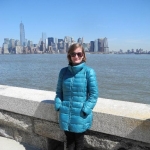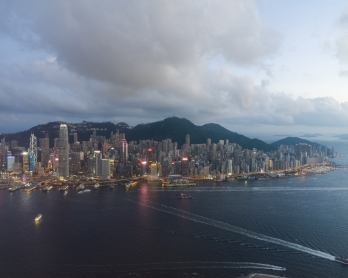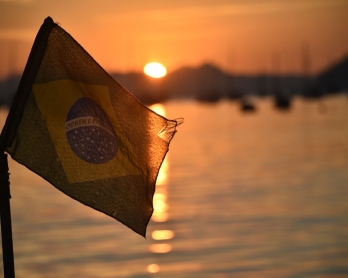In a New York minute
New York City -- The first time I grabbed lunch in New York, I was yelled at. Back then, I was embarrassed, apologetic and intimidated. By the time I left, I was yelling myself.
New York does that to people.
At the time, I was "fresh off the boat" or more precisely fresh off a flight after 10 years living in the Middle East, Africa, and South Asia, and amazed by everything.
I stood in line at the deli during the lunchtime crush and counted 27 different varieties of egg sandwich. 27. 'Bloody hell,' I thought, wondering how anyone could splice, dice and mix egg 27 ways. My mind blank, I failed to rattle off my order the split second the server turned to me.
"Hey, make up your mind or get out of line!" yelled the guy behind the counter.
I got out of line, shuffled off and never went back.
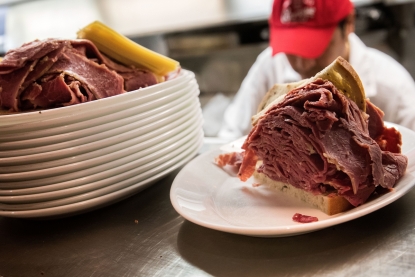 A pastrami on rye sandwich sits on the counter at Carnegie Deli, October 3, 2016 in New York City. (AFP /Getty Images/ Drew Angerer)
A pastrami on rye sandwich sits on the counter at Carnegie Deli, October 3, 2016 in New York City. (AFP /Getty Images/ Drew Angerer)Five years later, I'm leaving New York as impatient as the next straphanger. Having to wait more than a few seconds at the lights, the indignity of a tourist dawdling on the sidewalk or the provincial hideousness of not being able to get precisely the right size in uber-over-priced yoga pants at the click of a mouse can reduce me to spluttering outrage.
When I lived in Sudan and Pakistan, people back home would react with pity. The second I moved to New York, everything changed. Friends and family I hadn't seen in years suddenly came flocking, drawn to what is one of the most high-octane cities in the world, with a glamour, chutzpah and adrenaline that make everywhere else look shabby, backward and agonizingly slow.
Even for a nervous flier such as myself, the descent over Manhattan's glittering skyline never gets old. The wastelands of the New Jersey turnpike are instantly transformed when Freedom Tower, the building that symbolizes resilience, built on the World Trade Center site after the 9/11 attacks, shimmers into view.
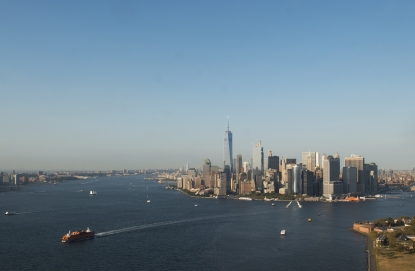 The skyline of lower Manhattan, including the Freedom Tower, September, 2016.
(AFP / Saul Loeb)
The skyline of lower Manhattan, including the Freedom Tower, September, 2016.
(AFP / Saul Loeb)New York is a city on speed. In the city that never sleeps, loitering is a waste of time -- perhaps the worst sin of all. Time is money, there's always a million things to do and never enough time to do it all.
Traffic light has just turned red? Make a sprint for it. Subway car too crowded? Simply get on, shove forward and yell at everyone to back up.
You may be a nobody, but you're sharing the most crowded US real estate with some of the richest, most talented, most successful people on the planet.
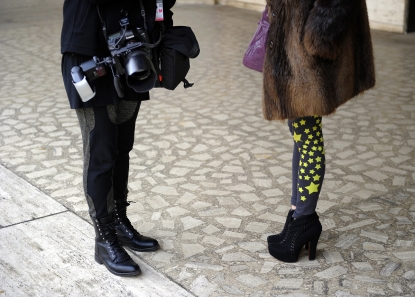 The beautiful people -- fashion show attendees during Fashion Week in New York, February 11, 2011.
(AFP / Timothy A. Clary)
The beautiful people -- fashion show attendees during Fashion Week in New York, February 11, 2011.
(AFP / Timothy A. Clary)When I first arrived, Robert de Niro shot a film round the corner. There was brief excitement of frequenting the same burger joint as famed British writer Martin Amis (never saw him).
Later moving to Harlem, my bus stop was 110th Street -- as in the Bobby Womack song. Up the road was the Apollo Theatre, launch boat of a thousand careers.
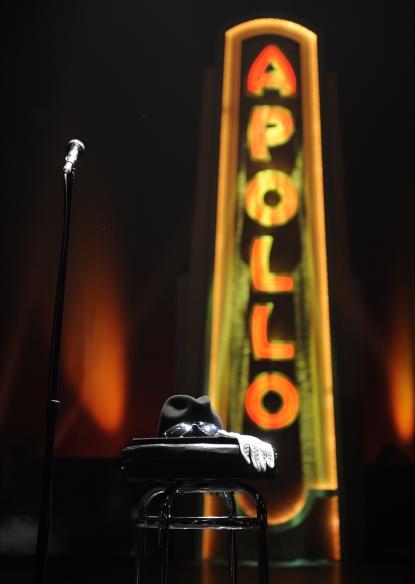 A microphone next to a chair with a hat, sunglasses and a white glove on stage prior to a public memorial for pop star Michael Jackson June 30, 2009 at the Apollo Theater in Harlem.
(AFP / Stan Honda)
A microphone next to a chair with a hat, sunglasses and a white glove on stage prior to a public memorial for pop star Michael Jackson June 30, 2009 at the Apollo Theater in Harlem.
(AFP / Stan Honda)Even I, one of the least go-outy people in the city, have rubbed shoulders at parties with the likes of Naomi Campbell (stunning), Donatella Versace (creepy) and Lady Gaga (tiny). Anna Wintour has more than once appeared to fix her frosty gaze on my exceedingly unfashionable green puffer coat.
To skeptical, anti-American types, I retort that New York represents the best of America. Tolerant, striving for renewal, endlessly optimistic and inclusive -- a place where Hebrew and Arabic are spoken in the same subway car, and little old grannies tolerate deafening rap music.
It's a city of constant regeneration.
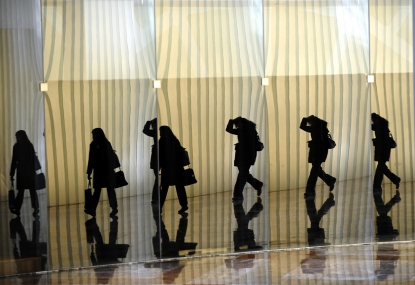 A woman is reflected in the mirrored walls at the World Financial Center in Lower Manhattan's Battery Park City February 24, 2011. (AFP / Timothy A. Clary)
A woman is reflected in the mirrored walls at the World Financial Center in Lower Manhattan's Battery Park City February 24, 2011. (AFP / Timothy A. Clary)A gateway for immigrants for generations, you can grab an Israeli breakfast, Yemeni for lunch and get Chinese delivered to your apartment for dinner.
During my assignment, Eid al-Fitr and Lunar New Year were introduced as school holidays; Jewish high holidays have been such for years.
My Indian neighbors put up a chocolate advent calendar in the lobby, the girl next door kept a queer-women-feminist holiday wreath. Menorahs, not just Christmas trees, grace almost every public building come December.
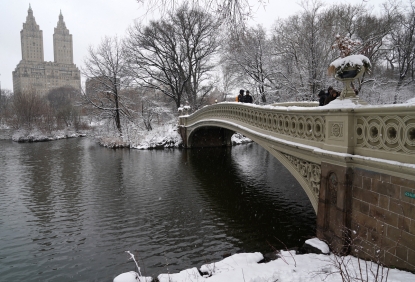 Snow around the Bow Bridge in Central Park in New York March 21, 2018 as the fourth nor'easter in a month hits the tri-state area on the first full day of spring. (AFP / Timothy A. Clary)
Snow around the Bow Bridge in Central Park in New York March 21, 2018 as the fourth nor'easter in a month hits the tri-state area on the first full day of spring. (AFP / Timothy A. Clary)My (British) accent rarely elicits comment, you're accepted into a melting pot where millions come from somewhere else and that "else" is never as important as being in New York in the first place.
As corny as it sounds, it makes you more accepting. No longer do I assume when someone references a partner they mean a) their business associate or b) a member of the opposite sex. It can also made you more strident, #MeToo zeal opening my eyes to inequalities that I once shrugged off as "life".
After stints covering wars in Iraq, Afghanistan and Syria and for years self-conscious if my backside wasn't covered, I now barely notice crotch-skimming shorts in summer and think nothing of No Pants Subway rides.
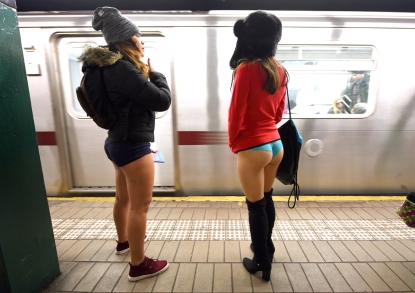 Attire as usual for the No Pants Subway Ride in the New York city subway, January 11, 2015. (AFP / Timothy A. Clary)
Attire as usual for the No Pants Subway Ride in the New York city subway, January 11, 2015. (AFP / Timothy A. Clary)The kinetic energy of sharing a tiny land mass with so many brilliant people encourages you to be more go-getting, fitter, slimmer, more informed, cooler and instills you with a desire to be richer.
New York has been a convergence of my past lives. There's a branch of my favorite Jerusalem sandwich spot, Afghan kebab joints, Greek-speaking restaurateurs, fine art auctioneers out from London, Syrian refugees taken around Central Park and treated to a taste of pizza by a tour guide.
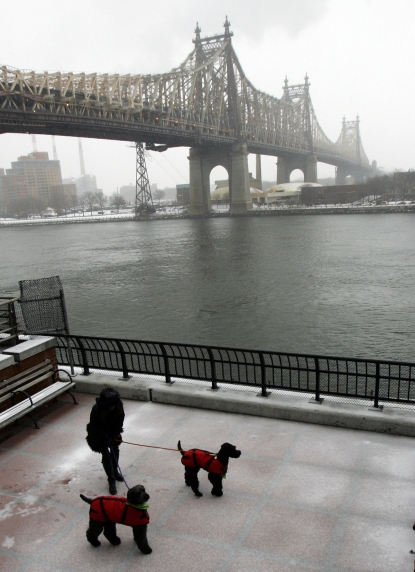 A woman walks her two dogs in the snow along the East River in New York 16 March 2007. (AFP / Timothy A. Clary)
A woman walks her two dogs in the snow along the East River in New York 16 March 2007. (AFP / Timothy A. Clary)It was in New York that I saw Abu Hamza, the bane of the British tabloids, sentenced to life in prison, albeit after the unflinchingly fair female judge offered him a donut.
In New York, where I saw Hillary Clinton anointed the first woman presidential nominee of a major party, where I watched a shell-shocked Donald Trump claim victory in the 2016 election before a room full of drunken, frat-style supporters.
If the American Dream, however hard, still lives and thrives in New York, like most things American that look shiny on the surface, not everything that glitters is gold.
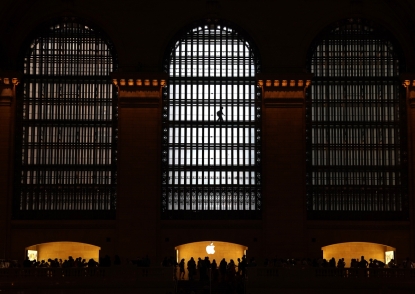 Grand Central Station, August 3, 2018.
(AFP / Timothy A. Clary)
Grand Central Station, August 3, 2018.
(AFP / Timothy A. Clary)The subway is in full-blown crisis, never will I miss the awful crushing commute and yes I have seen human excrement on the platform.
It's a slave to all things money, eye-wateringly, at times prohibitively expensive. Increasingly only the super rich can thrive in Manhattan, the rest of us forced to make long commutes from outer districts.
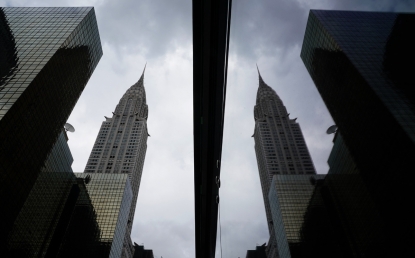 The Chrysler Building is reflected in a store front window on 42nd Street in New York City, August 3, 2018. (AFP / Timothy A. Clary)
The Chrysler Building is reflected in a store front window on 42nd Street in New York City, August 3, 2018. (AFP / Timothy A. Clary)Chronic homelessness, the opioid crisis, racial divides in healthcare, education and housing, somehow never get enough attention.
I splurged my life savings on the down payment for an apartment you can barely swing a cat in, and even then had to rent out my bedroom from time to time to afford luxuries I once took for granted.
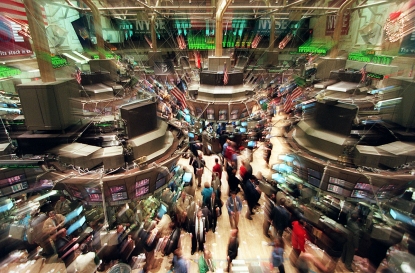 Traders on the floor of the New York Stock Exchange, December 12, 1997.
(AFP / Timothy A. Clary)
Traders on the floor of the New York Stock Exchange, December 12, 1997.
(AFP / Timothy A. Clary)Recycling is light years behind Europe. Trash piled up on muggy nights whiffs like the beach in Gaza or a sewer in Baghdad. Roads are strewn with potholes.
Perhaps the only thing Democrats and Republicans agree on are New York's "third-world" airports.
My five years has seen a depressing cycle of dead celebrities, not from natural causes, but drug overdoses and suicides. In 2014, a black father of six died after police put him in a chokehold for selling illegal cigarettes.
If the city is endlessly stimulating, it can be utterly maddening. There are few other places in the world where you have to open the window or whack on the a/c when it's snowing because the building won't turn down the Sahara-level of central heating.
New York officialdom exists on a constant, seat-of-your pants kind of panic.
In summer, you're assailed with warnings about dangerous heat. When it rains, flash flood alerts drone on your cell phone. In winter, apocalyptic warnings of looming snow-maggedon provoke stockpiling and binge watching.
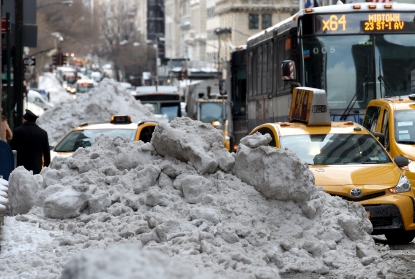 A giant pile of snow is seen on March 15, 2017 in New York, the morning after Winter Storm Stella dumped snow and sleet across the northeastern US. (AFP / Timothy A. Clary)
A giant pile of snow is seen on March 15, 2017 in New York, the morning after Winter Storm Stella dumped snow and sleet across the northeastern US. (AFP / Timothy A. Clary)The last two years have been scarred by the collective nervous breakdown of liberal America, still shocked, angst-ridden and disbelieving that Trump is president of what they and the rest of Americans consider the greatest country on earth.
What lurks under the surface, yet so rarely acknowledged is that he's one of them. Like it or not, he's a New Yorker, the ultimate personification of its 1980s brash.
Trump's ascendancy has been the ultimate slap in the face for the Manhattan elite who snubbed the tycoon over his trashy divorces, casino meltdowns and bankruptcy scandals.
His vision of America is the antithesis of what collective New York stands for. His pronouncements send elected representatives, chat show hosts, actors and musicians into a tizzy. Even Wall Street is nervous.
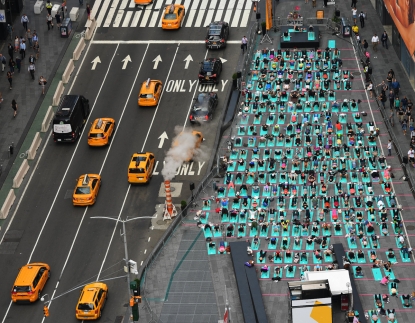 Taking a break in the city that never sleeps -- people partake in the 15th annual Times Square yoga event celebrating the Summer Solstice, the longest day of the year, during classes in the middle of Times Square on June 21, 2017.
(AFP / Timothy A. Clary)
Taking a break in the city that never sleeps -- people partake in the 15th annual Times Square yoga event celebrating the Summer Solstice, the longest day of the year, during classes in the middle of Times Square on June 21, 2017.
(AFP / Timothy A. Clary)A city so large and so powerful in a decentralized America is largely shielded from federal incursions. The tourists still flock. Broadway's doing better than ever and most problems predate the Trump administration.
Yet even here, immigrant round-ups have become reality. Thousands of undocumented workers live in a parallel universe. Hatred is on the rise. In a city where, at 13 percent, the Jewish population is the largest outside Israel, synagogues have been vandalized.
When I tell US friends that New York and America will survive Trump, they seem unsure, the American exceptionalism and legendary confidence now profoundly frayed.
As I leave, what I'll remember most are the ordinary New Yorkers I have met, dazzling in their diversity, and giants I have reported on. Scions of the American dream, designers like Ralph Lauren or Tommy Hilfiger, Microsoft magnate Bill Gates, whose hotel bathroom was bigger than my apartment. Or the straight-out-of-the-movies defense lawyers, the toiling migrant workers living in the shadows just to give their children a better life.
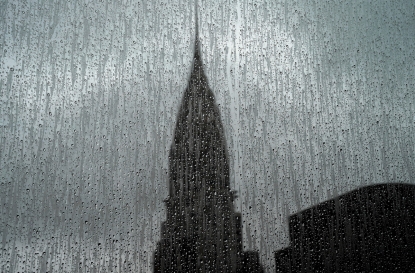 A rainy view on the Chrysler Building in New York City, August 13, 2018 (AFP / Timothy A. Clary)
A rainy view on the Chrysler Building in New York City, August 13, 2018 (AFP / Timothy A. Clary)Above all, New York puts you in your place. King of the world one minute, chewed up and spat out the next.
There's nothing more brutal than slumming it home on the subway after bumping into Rihanna at a party, interviewing a 20-something composer about his new musical or have a baby-faced millionaire step over you at Christie’s after dropping more money on a piece of art than you'll earn in a lifetime.
Even then, it's still the best place I've ever lived or probably will live.
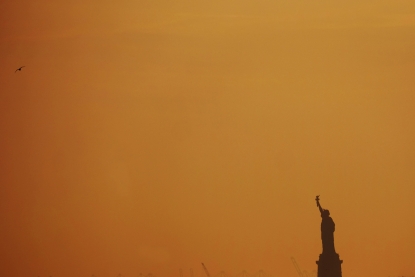 The Statue of Liberty at sunset, March 8, 2016. (AFP / Jewel Samad)
The Statue of Liberty at sunset, March 8, 2016. (AFP / Jewel Samad)


